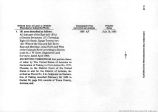| OCR Text |
Show APPENDIX IX 1X21 sufficient power, principally the § 5 contract power, to direct, manage, and coordinate their operation. Subjecting the Secretary to the varying, possibly inconsistent, commands of the different state legislatures could frustrate efficient operation of the project and thwart full realization of the benefits Congress intended this national project to bestow. We are satisfied that the Secretary's power must be construed to permit him, within the boundaries set down in the Act, to allocate and distribute the waters of the mainstream of the Colorado River. II. Provisions in the Secretary's Contracts. A. Diversions above Lake Mead.-The Secretary's contracts with Arizona and Nevada provide that any waters diverted by those States out of the mainstream or the tributaries above Lake Mead must be charged to their respective Lower Basin apportionments. The Master, however, took the view that the apportionment was to be made out of the waters actually stored at Lake Mead or flowing in the mainstream below Lake Mead. He therefore held that the Secretary was without power to charge Arizona and Nevada for diversions made by them from the 275-mile stretch of river between Lee Ferry and Lake Mead95 or from the tributaries above Lake Mead. This conclusion was based on the Master's reasoning that the Secretary was given physical control over the waters stored in Lake Mead and not over waters before they reached the lake. We hold that the Master was correct in deciding that the Secretary cannot reduce water deliveries to Arizona and Nevada by the amount of their uses from tributaries above Lake Mead, for, as we have held, Congress in the Project Act intended to apportion only the mainstream, leaving to each State its own tributaries. We disagree, however, with the Master's holding that the Secretary is powerless to charge States for diversions from the mainstream above Lake Mead. What Congress was doing in the Project Act was providing for an apportionment among the Lower Basin States of the water allocated to that basin by the Colorado River Compact. The Lower Basin, with which Congress was dealing, begins at Lee Ferry, and it was all the water in the mainstream below Lee Ferry that Congress intended to divide among the States. Were we to refuse the Secretary the power to charge States for diversions from the mainstream between Lee Ferry and the damsite, we would allow individual States, by making diversions that deplete the Lower Basin's allocation, to upset the whole plan of apportionment arrived at by Congress to settle the long-standing dispute in the Lower Basin. That the congressional apportionment scheme would be upset can easily be demonstrated. California, for example, has been allotted 4,400,000 acre-feet of mainstream water. If Arizona and Nevada can, without being charged for it, divert water from the river above Lake Mead, then California could not get the share Congress intended her to have. B. Nevada Contract.- Nevada has excepted to her inclusion in Paragraph II (B) (7) of the Master's recommended decree, which provides that "mainstream water shall be delivered to users in Arizona, California and Nevada only if contracts have been made by the Secretary of the Interior, pursuant to Section 5 of the Boulder Canyon Project Act, for delivery of such water." While the California contracts are directly with water users and the Arizona contract specifically contemplates further subcontracts with actual users, it is argued that the Nevada contract, made by the Secretary directly with the State of Nevada through her Colorado River Commission, should be construed as a contract to deliver water to the State without the necessity of subcontracts by the Secretary directly with Nevada water users. The United States disagrees, contending that properly construed the Nevada contract, like the Secretary's general contract with Arizona, does not exhaust the Secretary's power to require Nevada water users other than the State to make further contracts. To construe the Nevada contract otherwise, the Government suggests, would bring it in conflict with the provision of § 5 of the Project Act that "No person shall have or be entitled to have the use for any purpose of the water stored as aforesaid except by contract [with the Secretary] made as herein stated." Acceptance of Nevada's contention here would not only undermine this plain congressional requirement that water users have contracts with the Secretary but would likewise transfer from the Secretary to Nevada a large part, if not "The location of Hoover Dam is a result of engineering decisions. As Senator Pittman pointed out, "There is no place to impound the flood waters except at the lower end of the canyon." 68 Cong. Rec. 4413 (1927). |









































































































































































































































































































































































































































































































































































































































































































































































































































